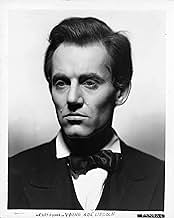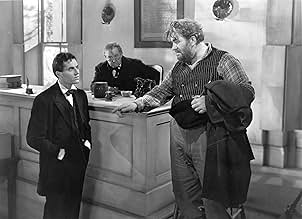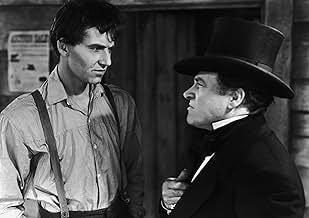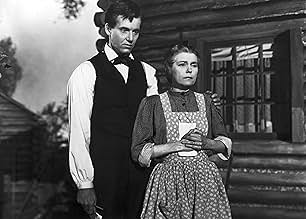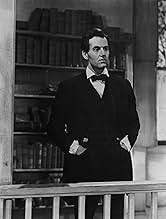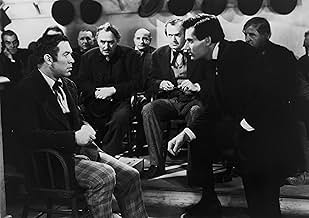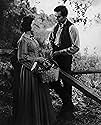Füge eine Handlung in deiner Sprache hinzuA fictionalized account of the early life of the American president as a young lawyer facing his greatest court case.A fictionalized account of the early life of the American president as a young lawyer facing his greatest court case.A fictionalized account of the early life of the American president as a young lawyer facing his greatest court case.
- Für 1 Oscar nominiert
- 6 Gewinne & 2 Nominierungen insgesamt
- Carrie Sue
- (Nur genannt)
- Man with Lynch Mob
- (Nicht genannt)
- Townsman Dancing at Party
- (Nicht genannt)
- New Salem Townsman
- (Nicht genannt)
- Carrie Sue
- (Nicht genannt)
- Peach Pie Baker
- (Nicht genannt)
- Loafer
- (Nicht genannt)
Empfohlene Bewertungen
In this movie Henry Fonda shows that he has a very good grasp of how to present humor. It is an aspect of him that has been lost over the years. When he is telling stories and jokes he has the timing down perfect. There is a sequence in the trial that had me laughing quite hard. He shows this gift again in The Lady Eve in 1940.
The ending by John Ford is absolutely brilliant with Henry Fonda going to the top of a hill and in the distance a tremendous storm symbolic of the Civil War. He goes forward into history. The movie is fiction but the insight into Lincoln is tremendous. Definitely worth seeing again.
Maybe that's why I love it. You can see Ford coming to terms with the grand, Griffithesque vision of America through its most complicated avatar, Lincoln. Ford's love for his country was more like Lincoln's than Griffith's, anyway: like Lincoln, he acknowledged the genius of the democratic experiment, but he was also aware of its dangers: mob rule and self-satisfaction. YML's greatest scenes are all about this.
First, there's the local parade Abe attends, surrounded by yahoos whom he loves but also sees for what they are. (We see him in another scene accepting a legal case from one of these -- and warily biting the coin offered him for a retainer.) Veterans of the recent War of 1812 and Indian Wars march through; the crowd is wild for them, Abe merely respectful.Then a agon of old men in tricorners is pulled through the parade route. No one seems to know who they are. Lincoln quietly informs his friends that they are veterans of the War for Independence -- and gravely doffs his stovepipe hat. His friends, mildly ashamed (it appears) of their prevous jingoistic glee, follow suit, and stand silent and hatless as the old men pass.
Then the mildly ludicrous plot -- about two brothers accused of another man's murder -- kicks in, and Abe goes to work. The scene where he confronts a lynch mob, putting his foot up against the log they're using for a battering-ram against the jailhouse door, is a classic by any standard. But note how Abe talks to the mob on its own level while remaining, in spirit, resolutely on his own higher plane. After appealing to their macho impulses by offering to "lick any man here," he delivers a house-divided speech that soothes their savagery and leaves them confused and irresolute. "Dontcha wanna put that log down now, boys?" he asks when they have been flummoxed by his eloquence. "Ain't it gettin' a mite heavy?"
Throughout Ford indulges in shameless historical foreshadowings that would have made Stephen Vincent Benet blush. Abe meets Mary Todd and Stephen Douglas; he rides down a dirt road with a bumpkin who's playing a new tune called "Dixie" on a jaw-harp. "Kinda makes you feel like marchin'!" says the bumpkin, as he and Abe ride through a muddy patch in the road.
The ending is impossible to describe without inviting derision, but I swear to you, it works. Having won his case, Lincoln allows as how he might take a walk -- "maybe to the top of that hill." As he trudges on, the skies send down rain and lightning -- and Abe seems to know what this is a prelude to.
I acknowledge the superiority of the great Ford films that came after, but I will always have a special place in my heart for "Young Mr. Lincoln." Independence Day (the federal day of observance, not the movie) is coming; you could do far worse than to watch this great film before the barbecue.
The film marked Ford's first of nine collaborations with Henry Fonda and is also a quintessential example of Ford's folksy Americana vein. A beautifully made and pictorially quite poetic piece of work, the courtroom sequences (and eventual revelation) in its second half still pack quite a wallop, apart from giving stalwart character actor Donald Meek a memorably meaty role as the prosecuting attorney.
Fonda is, of course, perfectly cast as a bashful, inexperienced but rigorous and humanistic lawyer who was destined to become President; Fonda would go on to portray other fictitious politicians on film - most notably in Franklin J. Schaffner's THE BEST MAN (1964) and Sidney Lumet's FAIL-SAFE (1964) - and it's surprising now to learn that he was reluctant at the time about accepting the role of Lincoln since, in his view, that was "like playing God"!
It is interesting to note here that Ford had previously tackled Abraham Lincoln (tangentially) in THE PRISONER OF SHARK ISLAND (1936), a superb but perhaps little-known gem which has, luckily, just been released as a Special Edition DVD by the UK's veritable Criterion stand-in, Eureka's "Masters Of Cinema" label. Besides, I also have two more Abraham Lincoln films in my DVD collection which I've yet to watch and, incidentally, both were directed by D. W. Griffith - THE BIRTH OF A NATION (1915) and ABRAHAM LINCOLN (1930) - and, had I not just received a bunch of films I've never watched before just now, I would have gladly given them a spin based on my highly-satisfying viewing experience with YOUNG MR. LINCOLN.
Wusstest du schon
- WissenswertesJohn Ford and producer Darryl F. Zanuck fought an extended battle over control of the film. Ford even had unused takes of the film destroyed so the studio could not insert them into the movie. One scene that Ford insisted on cutting was a scene where Lincoln met his future assassin, a very young John Wilkes Booth.
- PatzerLincoln is shown playing "Dixie" on a Jew's harp. That portion of the film is ostensibly set in the year 1837, but most reliable sources indicate that "Dixie" wasn't written, publicly performed nor published before 1859. During the Civil War, Lincoln was known to be partial to the tune (it was almost as popular in the North in the 1860s as in the South), but it's unlikely he would have heard it in the 1830s.
- Zitate
Abe Lincoln: [cross-examining Cass] J. Palmer Cass.
John Palmer Cass: Yes, sir.
Abe Lincoln: What's the "J" stand for?
John Palmer Cass: John.
Abe Lincoln: Anyone ever call you Jack?
John Palmer Cass: Yeah, but...
Abe Lincoln: Why "J. Palmer Cass?" Why not "John P. Cass?"
John Palmer Cass: Well, I...
Abe Lincoln: Does "J. Palmer Cass" have something to hide?
John Palmer Cass: No.
Abe Lincoln: Then what do you part your name in the middle for?
John Palmer Cass: I got a right to call myself anything I want as long as it's my own name!
Abe Lincoln: Well then if it's all the same to you, I'll call you Jack-cass.
[Roar of laughter from spectators]
- VerbindungenFeatured in The Blue Bird (1940)
- SoundtracksThe Battle Cry of Freedom
(1862) (uncredited)
Written by George Frederick Root
Played during the opening credits and sung by an unidentified chorus
Top-Auswahl
Details
Box Office
- Budget
- 1.500.000 $ (geschätzt)
- Laufzeit1 Stunde 40 Minuten
- Farbe
- Seitenverhältnis
- 1.37 : 1

